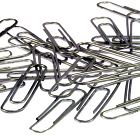How to produce better radio, using your showprep content effectively? Research, Internalize and Perform – and always aircheck, evaluate and improve – to keep radio from R.I.P.
Capital FM East Midlands program director Dick Stone shared his experience on radio show prep and air checks at the nextrad.io conference in London recently. Why ordinary ‘paperclipping’ isn’t enough to keep radio alive, and how to make the most out of your show preparation and evaluation.
Prep instead of clip
“If you ever met any programming consultant, every other word they say is ‘prep’ – and they’ll charge you for it”, he jokes. Prep is often seen as cutting articles from newspapers, copy/paste content from websites, and using show prep services. It’s the old way of collecting your stuff, put it aside, enter the studio, and put it on. “That’s a little bit of prep – but it isn’t prep. If we carry on doing that, quite frankly we are dead because then all we’re doing is regurgitating the same old crap.” Instead, Stone offers his RIP-formula to use these bits of radio content much more effectively.
 R (Research)
R (Research)
“Look for stuff that excites you; that makes you laugh, angry, cry, wonder, or intrigued. It needs a spark of interest inside you – something that inspires you, gets you motivated and makes you want to share it. Paperclip the researched information, but put it through a filter.” For Dick Stone, the main question is if it’s interesting for the radio station’s target audience. “If it isn’t, keep it to yourself and don’t put it on air.”
I (Internalize)
Radio talents should go through the material, understand it, and make it their own. Getting emotionally involved is important: “When I hear you talk about it, I want to hear what it was that inspired you; what made you laugh or got you angry.” He warns for a common mistake: “Don’t ever take the original piece of material into a room where’s a live microphone. If you take a piece in written English where you really need to use spoken English, you sound like an idiot. People don’t talk like that in the real world. So internalize it and make it personal.”
 P (Perform)
P (Perform)
People who commute in the morning and afternoon usually drive for about 20 minutes. During this time they will hear about 2 links. The PD and DJ trainer makes clear that presenters should make the most out of these few moments. “If you’ve done this great bit of research, internalized it and made it your own, and then throw it out in the studio, that’s bad radio! Great content, poorly delivered, is poor content. So make it count when you go on-air.”
Turn prep into radio
Examples of questions to ask yourself, to transform rough show prep into compelling radio:
- What kind of music or FX do I need, if any?
- Do I need just me or more people to be involved in this?
- Do I need someone to ask me a question before I start doing this?
- Do I need someone to call in the end, as a kicker to get more listener calls?
- Do I need someone to half way through say something, to take it to a new level?
- Can I play some kind of quiz with my radio audience based on this?
- Can I make a mock news bulletin out of it?
- Can I make a fake ad based on it?
- Can I make a sketch out of it?
 Rehearse & edit your performance
Rehearse & edit your performance
“Work all that out, so when it comes to the point when you open the mic and deliver it, it’s not the first time that you hear it.” The programmer clarifies that you don’t have to rehearse it out loud – you can also run it all through in your mind. Sometimes you need to kill your darlings and be selective: “Cut out the bits that are not relevant. Just tell the story and make it accessible. Keep the bits that make it interesting. RIP your content, so radio will not Rest In Peace.”
Experience helps, content matters
Would European radio benefit from older jocks on the air, like in the USA? Because they have more life experience? Stone thinks that age isn’t an issue. “It is all about if you have something interesting to say. My children and their friends are fascinating; what they talk about is amazing. Having said that, it is obviously easier if you’re older to remember what it was like when you were younger, rather than the other way around. If you can get a topic and you understand it, so you can speak authoritatively on it, it will work.”
 Aircheck radio talents constantly
Aircheck radio talents constantly
Constantly coaching talent (the right way) is essential for a program director. “Most of my time is spent on coaching presenters. It’s the job, as far as I’m concerned. When I was on the air myself, aircheck coaching involved going into your boss’ office, sitting on a chair that was a lot lower than his, making you feel awkward. He would play your last show very loud, so everyone could hear it and make a piss of you. That isn’t coaching, that’s just torture.”
Keep an open mind
Stone tries a more constructive approach because he knows what makes radio people tick. The fact that they put themselves in front of the audience, makes them sensitive for critique. “What you give on the air, is a little bit of you. So when someone criticizes it, you really take it personally. Find your way around those defenses. Pointing out how you could do it better, will improve the next performance. This is the most important thing that you can do.”
 About
About
Dick Stone is program director of Capital FM East Midlands. He works in the UK radio industry for 25 years. During his quarter of a century radio career he’s been programming local stations, regional networks and radio groups as well. Apart from his PD job within the Capital FM network, Stone coaches radio talents and fellow programmers. He blogs at dickstone.blogspot.com and twitters @dickstone.





Add Your Comment